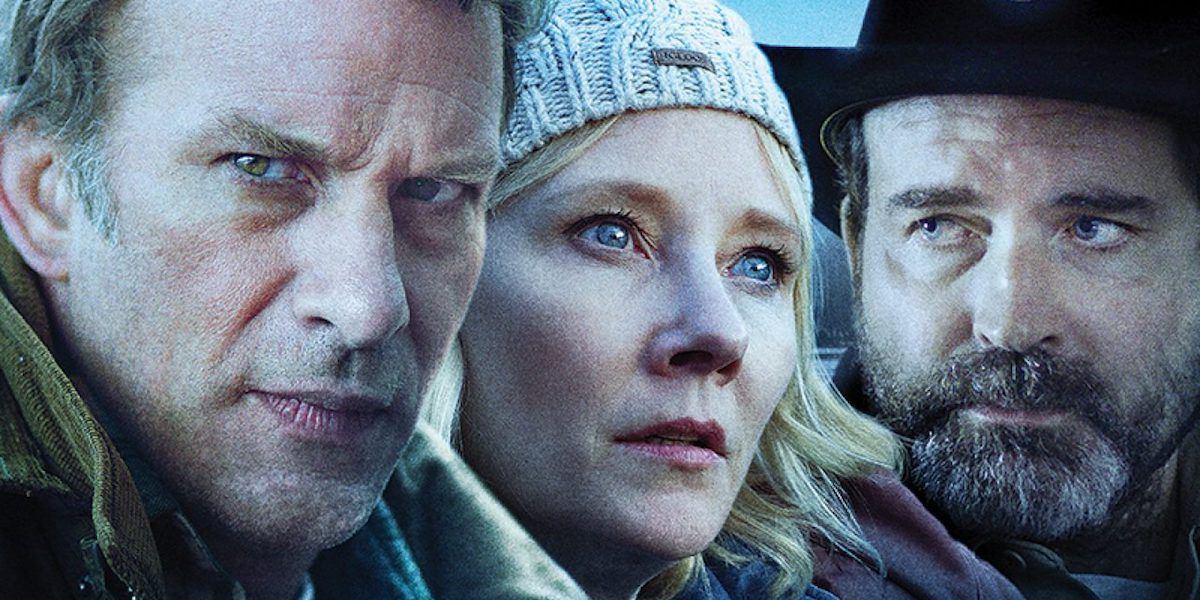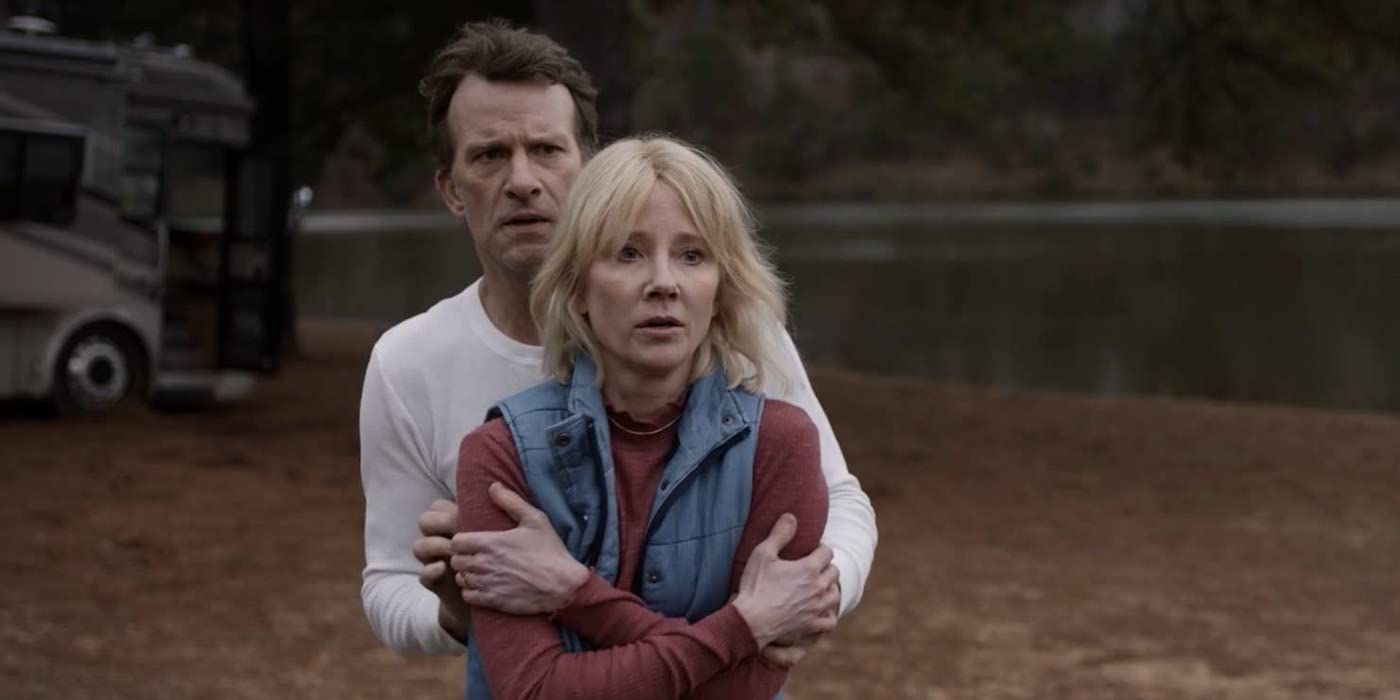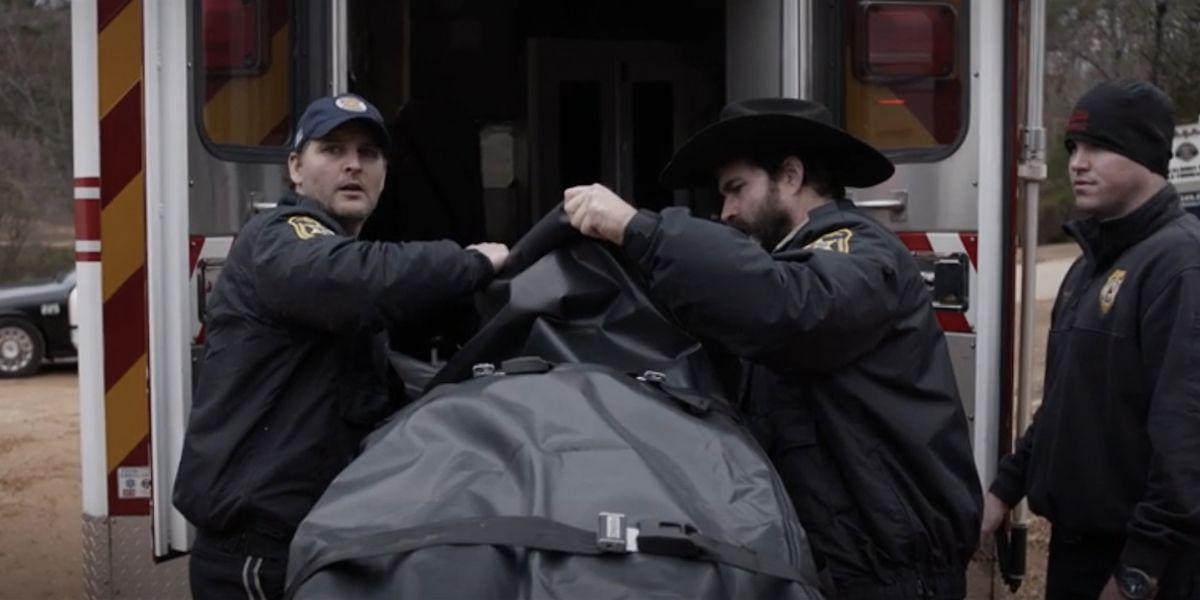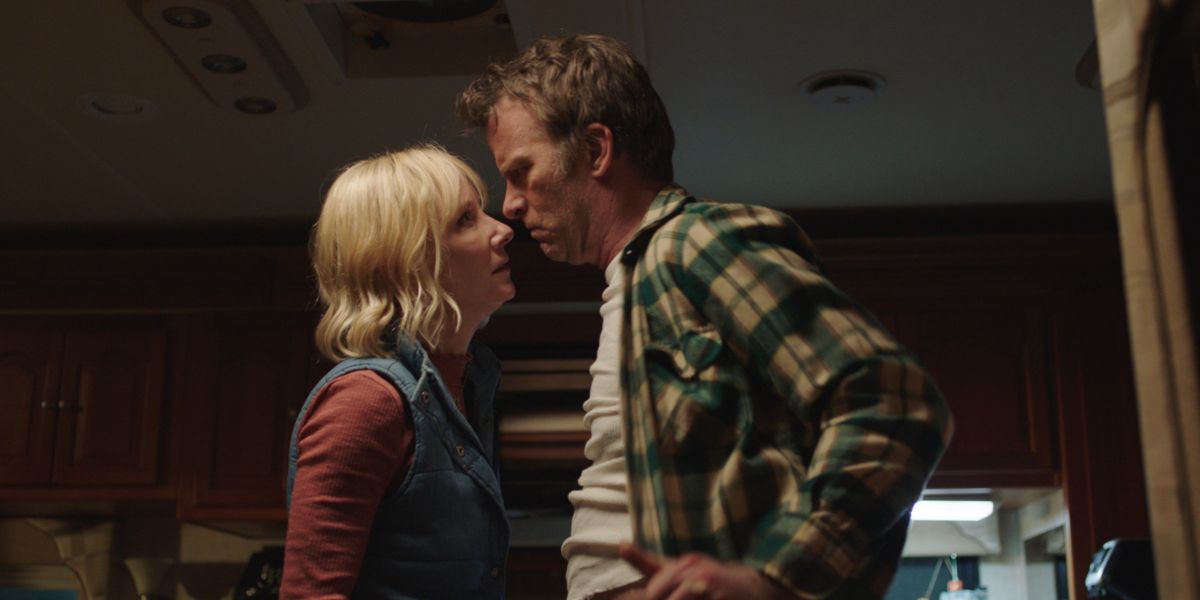Thomas Jane, Anne Heche, and Jason Patric star in The Vanished, written and directed by Peter Facinelli (Supergirl, Twilight). For his second feature, Facinelli dives into the dynamic between a husband and wife who are completely shattered by the sudden disappearance of their young daughter while on an RV vacation. Patric co-stars as the local sheriff investigating the case who has long been suffering with the loss of his own son in the past.
The Vanished shines bright as a showpiece for these three actors, whose talents Facinelli (himself best known for his work in front of the camera, and who plays a supporting role in the film) so effortlessly captures via tight scripting and a Hitchcock-style focus on intimate claustrophobia. The Vanished is a difficult watch, but also compelling, entertaining, and often profound in its portrayal of personal failings and the strength we derive from others, for better or worse.
While promoting the upcoming release of The Vanished, Peter Facinelli spoke to Screen Rant about the troubles and the triumphs of making an indie film, as well as the responsibility of playing integral roles in front of and behind the camera. He discusses his own parental anxieties that led to developing the movie, the constant battle to stay within budget every day on set, and an unexpected incident during which the production was shut down by a pack of wild hogs. He also explains how he originally thought he would play the Thomas Jane part before deciding to focus his efforts on directing instead. Finally, the triple-threat filmmaker shares some insight into Jason Patric's transformative role as a grief-stricken lawman whose performance is articulated more through his physicality and tremendous sense of presence than the dialogue in the script.
The Vanished releases August 21 in theaters, on Digital, and VOD.
When I was six or seven years old, I got lost in the supermarket for about 90 seconds, and I still remember it like it was yesterday. I was so scared.
It's every parent's worst nightmare. I think it's every kid's worst nightmare. I was lost in the supermarket myself, once, and I remember it, too. It's terrifying when you're a child and you're lost like that. This movie came about because, when my oldest daughter was five, we took an RV trip from New York to Los Angeles. It took 30 days to go across the country. It was a beautiful trip. But I remember going to this one RV park, and while I was checking in, there were gunshots. They told me, "Don't worry, there's just a prison a couple of miles down the road, and they're doing drills. If you hear two or three shots, it's okay. If you hear more than that, four or five, come running to the front desk."
Not a terribly relaxing place to park an RV, I imagine.
I didn't sleep a wink that night. I just kept thinking, what if a convict escapes in the middle of the night? What if my daughter went missing? It would be like looking for a needle in a haystack out here! That started the seedlings of this movie for me. Then, I remember when my other daughter was a little older, she actually went missing for about ten minutes. I turned my back, and she thought somebody else was me and started walking away with them, and I couldn't find her for ten minutes. It was the longest ten minutes of my life. Thank God I found her. You know, all these thoughts go through your mind, like, "What if I never see my child again?" I was literally having a panic attack. If someone were to say, "That person over there has your kid," there's nothing I wouldn't do to get my kid back. I started thinking, what would these parents do? How far would these parents go to get their kids back? And that led to the film.
These parents really push that to the extreme limits in the movie.
I wanted to explore a relationship between a husband and a wife because they say, when there's a tragedy in a family like that, a lot of times the marriage doesn't survive because they blame each other. So I thought, what kind of an effect would a tragedy like losing a child have on a marriage? How could they keep their marriage together through this? By teaming up to have a chance to find their kid. And then I looked at Jason Patric and his wife, those characters, as the "ghost of Christmas future" for Tom and Anne. Like, if they didn't team up to find their child, Jason Patrick's character, the sheriff, he lost his child due to drug addiction and his marriage crumbled. They're ships passing in the night. If Tom and Anne don't team up to connect, then they'll end up like Jason's character and his wife.
There's an incredible dynamic between these people. I love how few characters there are and how well-developed they are. Every second has meaning, every word is profound, you really make the most out of all of it. Is that a process of whittling down in draft after draft, to get to the core and the soul of these people?
Thank you very much for saying that. You know, honestly, I lived with this story in my head for so long, just thinking about it, and I wrote the script in three weeks. It really didn't change much at all. It took me longer to find the financing! It took me seven years to find the financing, but the script was done in less than three weeks. I was really excited when the money came along to actually make the film. We had such a great cast. We shot in Alabama and it becomes a moving train. Every day is a race against the clock. You have from sunup to sundown to get the lumber you need to build the house and make the movie. Every obstacle that you can imagine, or not imagine, is coming your way.
Can you talk about some of the adversity that came your way?
I remember, one day we had to shut down because there were wild hogs running around. We had to shut down for two hours. Every second counts when you're filming. We had weather issues where the lighting went out one night. There was a storm. We had one day where a dryer in the RV, and we weren't even using it, but it just started smoking for no reason, so the whole RV filled up with smoke, and we had to wait on that. Every time you're waiting on something, you're dying a small death. The clock is just ticking, louder and louder, in your mind. You're like, "I just need to get my shots!" You want to be able to get as much as you can before the sun goes down, and you don't want to rush through stuff, compromise stuff, and then you have these obstacles. That's the thing about directing: you have to be able to think quickly on your feet. I come up with a plan A and a plan B, and sometimes neither one of those works, so you just go with your gut and keep moving.
Wow, and that has to be even harder on an indie movie where you don't have money to burn, so to speak.
On the first day, I had a whole shot list, and we were going to do a whole day of steadicam work. We show up, and the steadicam's not working. Then, one of the actors didn't get on the plane in time, and we were supposed to move onto a scene, and they said, "Yeah, he just landed, he's not here yet." And then another actor, their costume didn't fit. So I'm sitting there going, "Okay, let's move this scene here, let's shoot this person's coverage, we'll wait for that actor to come and get his coverage. And then, can we do a dolly track instead of steadicam for this? Oh, the dolly track doesn't come until tomorrow? Okay, let's do a slider, put it on that. I've gotta keep the camera moving because this scene needs movement." You just keep going because the clock is ticking. And sometimes, it even ends up better than you expected. Who knows? Maybe the slider was a better creative choice than the dolly or the steadicam would have been! You're at the disposal of what the universe is giving you on that day.
I feel like a lot of people don't understand, especially with indie films, how difficult it is to scrape together enough money to actually make a movie, and how much work it takes to not run out of money once you're actually making the movie.
You feel that pressure to make a good film, pressure to make a good film for the investors and the audience, and to protect the actors and make sure they're happy with their work. And you're working with every department: costumes, hair, makeup, and everybody has questions every day. That's the pressure. But that pressure also gives you an adrenaline rush that drives you every day. I was sleeping four or five hours a night. And some days, I had to go to work and act in it, too. So I'd go to work and just wear my costume all day. I have a whole new profound respect for the people who can direct and play the leads in their own movies. It's not easy to be behind the camera and then jump in front of the camera, and then go back behind the camera. When you're in front of the camera, you're thinking, "Am I in frame?" You have to have a lot of trust in your cameraman. You don't have time to play back every single take. You have to move on to the other actors. You go, "Ah, I'll just cut around me!" It was crazy, but I wouldn't give it up for anything. It's a beautiful thing to have a whole team of people helping you create. That collaboration is so huge.
With that in mind, you do act in the movie, but you're not one of the main leads. When you were writing the script, did you have yourself in mind to play the Thomas Jane or the Jason Patric role?
Originally, when I wrote it, I thought maybe I could play the dad and someone else will direct it. I wrote it with me in mind to play the lead role, the dad, Thomas Jane's part. But after I directed my first feature, Breaking and Exiting, I thought, well, I would really love to direct this film. But I don't want to take on too much. I don't want to take on the lead and direct it. It's just too much right now. This is only my second feature. I was fortunate enough that Thomas Jane really liked the script, and then I got Anne Heche on board, and then Jason Patric came on board and the cast rounded out. I wrote the role of the deputy, and I thought... Well, the first film I directed, I wasn't in it, and I was jealous of the actors on the other side of the camera, so I thought, I can take this role and take a couple of days to act and direct. But those days were really stressful because I had to learn my lines the night before, I had my shot list, and I had so many things going on. It was hard to compartmentalize and go, okay, I've got to go in front of the camera and play this role for a second, and your head is spinning, and then wild hogs are shutting you down! (Laughs) I was glad I did it, though. It was just enough of a role for me to have fun with, but not enough where it overtook my focus from directing.
Do you see yourself, in the future, doing the Clint Eastwood or Mel Gibson thing, directing yourself as the lead?
Maybe one day! I love actors. I don't want to selfishly take up all the space where I want to write, direct, and act in all my stuff. I love being able to collaborate. I enjoy watching Thomas bring that role to life and bring something to it that maybe I wouldn't have thought of. It was fun in that sense. I don't want to say "never," because I want to be able to grow and maybe take that on as a challenge.
I've gotta shout-out Jason Patric. I was completely knocked out by his performance, and I have to admit, I didn't recognize him until halfway through the movie when I gasped and said out loud to myself, "Ooh, that's Jason Patric!"
I had another interviewer go, "Wow, Jason really let himself go."
Aw, rude!
I had to correct him, because it was all acting. Jason Patric had a fat pad on, and he grew a beard to make him look thick. If he shaved the beard and took off the fat pad, he's fit as a fiddle. The way he walks, the way he carries that fat pad, like you said, he's unrecognizable. He's such a talent. What I love about Jason, too, is that role, on paper, is difficult. It's difficult to write that multidimensional role on paper, but I always knew there was a lot more to that role than what's on paper. There's a sadness that character carries that you just can't write. He lost his child to a drug overdose. Jason brought that sadness in his eyes, and he carried it in his body, and he lifted it off the page. That's what I was looking for in that role. He made that role look a lot better than it was written. There were things I knew I wanted, but it had to come from casting. I could describe it, but I couldn't put it in the dialogue. Jason really took it to a whole other level.
Totally. The movie is about the five stages of grief, and it shows that acceptance is not necessarily a positive state. There's this manic peace to Tom and Anne's characters, where they gain meaning from looking for their missing daughter, while Jason, who lost his son and has accepted that, has lost that hope, and just has an empty hole where that meaning once was.
If Tom and Anne can blame other people, they won't blame each other, and in that, they connect. They stay together. Even when they're fighting, there's still an energy exchange. It's like, a relationship is dead when you stop fighting. When you become Jason Patric's character and his wife and you're not talking anymore. When you become the couple at the dinner table who is silent, not talking, not looking at each other, just eating in silence. That's when a relationship is dead. The fact that Tom and Anne go back and forth from teaming up to yelling at each other... At one point, they have an argument, and she's throwing all this s*** at him, and then it's suddenly almost if they're going to tear each other's clothes off for a second. There's this animalistic look they give each other, and then he goes into the room and slams the door. They're connecting. Even through the fights, they're connecting.
The Vanished releases August 21 in theaters, on Digital, and VOD.




